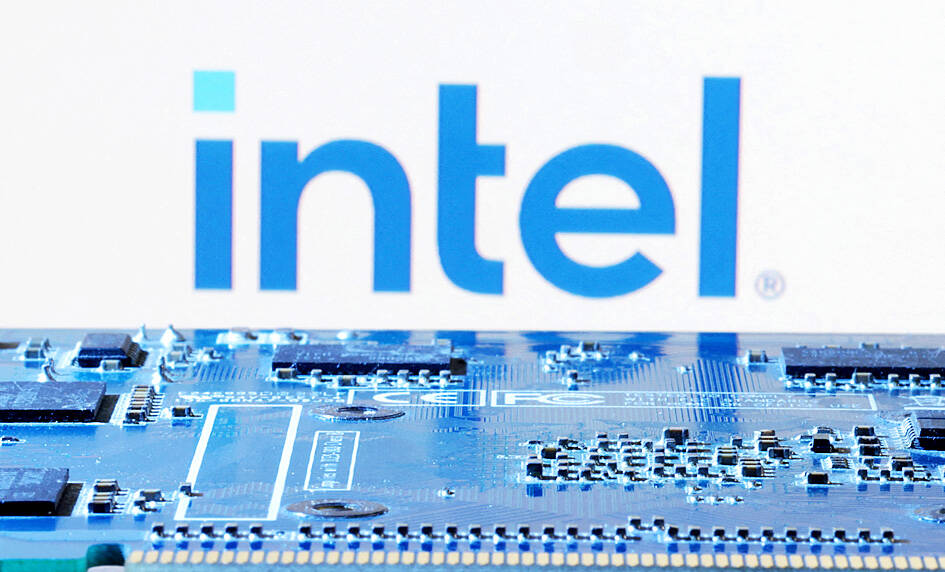Intel Corp is halting the expansion of a major factory project in Israel, which was going to pump an extra US$15 billion into a chip plant.
The chip giant in December last year said it was going to expand a US$10 billion plan at the Kiryat Gat site, in the south of the country, which is currently under construction.
Intel on Monday gave no reason for the pause and made no link to Israel’s conflict with Hamas in Gaza.

Photo: Reuters
“Israel continues to be one of our key global manufacturing and R&D [research and development] sites and we remain fully committed to the region,” Intel said in a statement.
“Managing large-scale projects, especially in our industry, often involves adapting to changing timelines,” the company said. “Decisions are based on business conditions, market dynamics and responsible capital management.”
Israel is Intel’s third-largest country of operation by asset size, after the US and Ireland, it said in its annual report.
The semiconductor giant has had a presence in Israel for 50 years, since the opening of a research center in Haifa.
During the 2010s, it became the leading employer in Israel’s thriving tech sector, Intel’s Web site says.
In 2017, the US company paid US$15.3 billion to take control of Israeli start-up Mobileye Global Inc, which specializes autonomous driving and in driver assistance systems.
Intel floated part of Mobileye’s capital on the New York Stock Exchange in October 2022, but retains control of the company.

When an apartment comes up for rent in Germany’s big cities, hundreds of prospective tenants often queue down the street to view it, but the acute shortage of affordable housing is getting scant attention ahead of today’s snap general election. “Housing is one of the main problems for people, but nobody talks about it, nobody takes it seriously,” said Andreas Ibel, president of Build Europe, an association representing housing developers. Migration and the sluggish economy top the list of voters’ concerns, but analysts say housing policy fails to break through as returns on investment take time to register, making the

NOT TO WORRY: Some people are concerned funds might continue moving out of the country, but the central bank said financial account outflows are not unusual in Taiwan Taiwan’s outbound investments hit a new high last year due to investments made by contract chipmaker Taiwan Semiconductor Manufacturing Co (TSMC, 台積電) and other major manufacturers to boost global expansion, the central bank said on Thursday. The net increase in outbound investments last year reached a record US$21.05 billion, while the net increase in outbound investments by Taiwanese residents reached a record US$31.98 billion, central bank data showed. Chen Fei-wen (陳斐紋), deputy director of the central bank’s Department of Economic Research, said the increase was largely due to TSMC’s efforts to expand production in the US and Japan. Investments by Vanguard International

STRUGGLING TO SURVIVE: The group is proposing a consortium of investors, with Tesla as the largest backer, and possibly a minority investment by Hon Hai Precision Nissan Motor Co shares jumped after the Financial Times reported that a high-level Japanese group has drawn up plans to seek investment from Elon Musk’s Tesla Inc to aid the struggling automaker. The group believes the electric vehicle (EV) maker is interested in acquiring Nissan’s plants in the US, the newspaper reported, citing people it did not identify. The proposal envisions a consortium of investors, with Tesla as the largest backer, but also includes the possibility of a minority investment by Hon Hai Precision Industry Co (鴻海精密) to prevent a full takeover by the Apple supplier, the report said. The group is

EARLY TALKS: Measures under consideration include convincing allies to match US curbs, further restricting exports of AI chips or GPUs, and blocking Chinese investments US President Donald Trump’s administration is sketching out tougher versions of US semiconductor curbs and pressuring key allies to escalate their restrictions on China’s chip industry, an early indication the new US president plans to expand efforts that began under former US president Joe Biden to limit Beijing’s technological prowess. Trump officials recently met with their Japanese and Dutch counterparts about restricting Tokyo Electron Ltd and ASML Holding NV engineers from maintaining semiconductor gear in China, people familiar with the matter said. The aim, which was also a priority for Biden, is to see key allies match China curbs the US